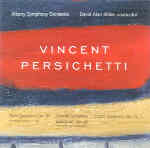These are very fine performances of three worthy symphonies, issued at two discs for the price of one (the total time for all three is just a bit more than 80 minutes). All three works are well-crafted, pithy, engaging, and even touching in the slow movements, but at the same time it’s easy to understand why they haven’t become part of the mainstream. Persichetti, like his colleagues such as Giannini, Mennin, Piston, Creston, Schuman, and to some extent Barber and Harris, belongs to a fairly well-defined school of American neo-classicists that sometimes display more of a corporate identity than they do individual character. This is particularly true of Persichetti, whose use of traditional forms and pungent harmony now comes across as very much “of its type”.
That does not mean that all of the music here sounds the same. The Third Symphony begins with a moving slow movement, and its thematic substance is quite memorable. The Seventh, like that of Sibelius, plays continuously in one movement, and unlike the other two works ends tranquilly. There’s plenty of variety both within and between works, and the Albany Symphony Orchestra plays with enthusiasm and precision (a few iffy bits of string ensemble aside) under conductor David Alan Miller. As with most productions from this source, the sonics are extremely clear, but also a touch dry. Persichetti’s textures are invariably spare and linear, and a little additional warmth would not have been amiss. Remember that the Fourth Symphony was premiered and recorded by the Philadelphia Orchestra under Ormandy, a recording also available from Albany, though its unimpressive mono sound is a decided limiting factor.
This description may sound like damning with faint praise, but it isn’t meant to be. If I were a British critic and this were a Chandos production of some second-tier English composer (say, Dyson, or Finzi, or Moeran), I could carry on about “yet another triumphant example of the extraordinary musical resurgence of the early 20th century, etc., etc.,” ad nauseam. But by the same token, and however well made these works are, there’s no point in pretending that they contain that spark of genius that would make them really stand out from the crowd, and that you can find in the best music of some of the other members of the group to which Persichetti belongs. That doesn’t mean I have any hesitation whatsoever in recommending this set to collectors, who should feel free to disagree with my assessment of Persichetti’s importance. Certainly I will return to these pieces with pleasure, secure in the knowledge that there’s still plenty of room for the good among the truly great.
































